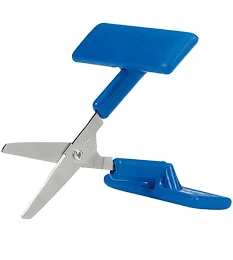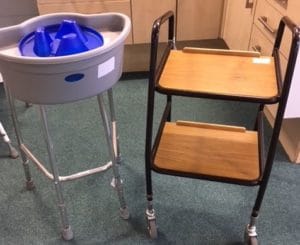Making meals and drinks may be difficult if you have problems with strength, range of movement, stamina, memory or sensory loss. Our Therapists can help you find ways to get involved with these everyday tasks, using equipment and finding techniques to make this safer and easier for you
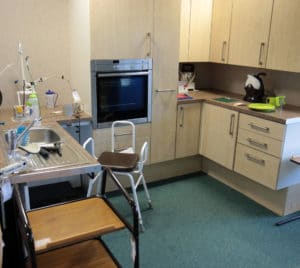
Storage solutions in the kitchen can make the room safer and more accessible for all. We have an accessible kitchen installed from First Class Independent Living at the ILC and can show you clever storage and access features from a pull-out larder, cantilevered pull-down shelves and pull-out work stations and drawers to make it easier to reach things without having to bend or stretch too much. These features can be powered or manually operated.
‘Rise and fall’ worktops can be used from either a standing or seated position. This is particularly useful for wheelchair users as there is space under the worktop to allow you to get close. Heatproof worktops, or even a large wooden chopping board, can be useful for putting down hot or heavy items quickly.
Appliances and the kitchen layout should be carefully thought out, bringing appliances to a lower height where possible. It is also useful to think about minimizing the distance between the sink, oven and fridge which makes it easier to prepare food. If you are worried about leaving the gas or electric hob on, there are safety devices which cut off the gas or electric supply.
Taps can be difficult to turn on and off when you have reduced strength and movement in your hand. Lever taps are easier to operate than crystal topped or crosshead taps. If your taps are difficult to grip, there are different plastic lever adaptations that you can try to simplify this task.
Jar openers can help with opening cans and jars if you find it difficult due to reduced grip, strength and dexterity. Grippy lids and electric openers are often helpful for managing this. You can try out a range of different options at the Centre to see what works for you the best.
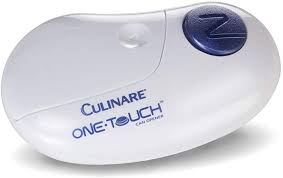
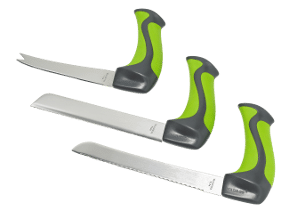
Scissors may be safer to use when preparing food than a knife, particularly if you have a tremor or are worried about safety when using a knife. Peta ‘Easy-Grip’ scissors have a simple plastic self-opening feature that only requires a gentle squeeze to cut. Another option is table top push down scissors which do not require finger movement/control.
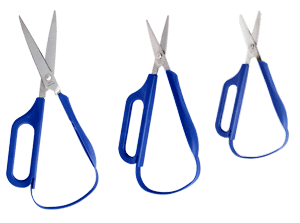
Chopping boards may have a raised edge or spikes and extra grip features to hold food in place while chopping. This is always safer if you are using one hand, or if a tremor prevents you from holding the item steady.
A non-slip mat under a chopping board will help to stabilise the base while you chop, there are endless uses in the kitchen for this simple non-slip material, we love finding new ways to use it. We also have the colourful Staybowliser which is a perfect non-slip holder for supporting a mixing bowl, as it can be positioned at just the right height and angle to suit your mixing style.
Kettles can be risky, especially if you have a tremor or have difficulty seeing or lifting the kettle. At the Independent Living Centre, we have the Uccello tipping kettle for you to try. We also have the Breville Hot Cup hot water dispenser; visitors find this so much easier than a traditional kettle. The dispenser holds 2 litres of cold water and at the touch of a button, just the right amount of boiling water is dispensed for your cup, mug, or pot. We would love to show you this alternative to a kettle so you can see how easy it is.
Liquid level indicators help someone with a visual impairment to pour a drink without spilling. We have this innovative gadget at the Independent Living Centre to see it in action.
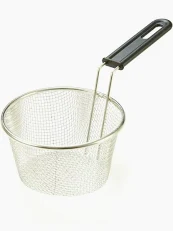
Microwave pans can be lighter than traditional pans, you can try our plastic pan to see if the long handle and lighter weight makes it easier for you to lift and move safely.
A perching stool in the kitchen may be just what you need if you aren’t able to stay standing in the kitchen at your hob, sink or worktop. You can try our perching stool and we can find the right height for you to ensure you feel safe and supported but are in a functional position to work in the kitchen. A top tip is to open the cupboard door when sat at the worktop to give more room for your knees!
The household trolley may be just what you need to help you to carry food and drink in the kitchen or around the house, especially if you rely on using walking equipment or if you have a tremor or weakness in your hands or arms. You can try out the traditional height-adjustable trolley and compare it with a trolley with brakes, a trolley with forearm supports and other walkers with caddies or trays to find what works best for you.
Talking labels are so helpful for someone with a visual impairment to help them find the right items in the cupboard. We can signpost you to the RNIB and other online specialists who make a range or textured, braille or talking labels and lids. We are also lucky in Devon to have some specialist services for people with sensory needs to find the right equipment and services.
Cleaning and laundry gadgets are often advertised in newspapers and magazines. We keep up-to-date with developments and can give you information about lightweight or robotic hoovers, as well as easy-reach long handled dustpans and brushes, simple clothes pegs and accessible lines.
See our ‘Technology for household tasks‘ equipment advice for information about safety devices, alarms and assistive technology for the kitchen and home.
